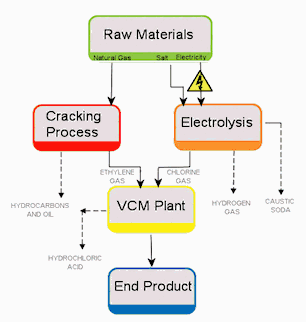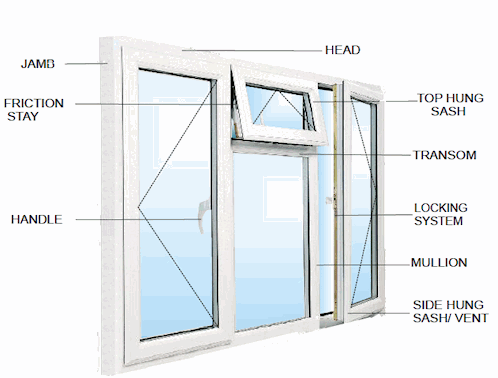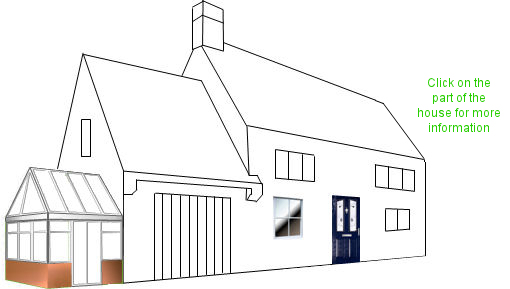|
|||||||||||||
  PVC Double Glazed WindowsWhat is PVC?PVC stands for Polyvinyl Chloride. What is interesting is that the Chloride makes up more than half the finished weight of PVC which is what makes the final window resistant to fire. The modern starting materials for the manufacture of PVC are oil and salt. Both of these are products of nature. Oil is “cracked” to produce Ethylene and other useful chemicals. The electrolysis of salt solution produces Sodium Hydroxide (or Caustic Soda) and Chlorine. Both of these products are extremely important chemicals. Much of the Sodium Hydroxide produced is used in the production of Aluminum Approximately a third of all Chlorine produced is used in the PVC manufacture. Another important use is for the bleaching of paper. The use of both salt, a staple commodity, and oil as starting materials in the manufacture of PVC helps to ensure a more stable price structure than if based on oil alone. The production of PVC is also less energy intensive than that of products derived entirely from petrochemicals. Ethylene and Chlorine are reacted to produce Vinyl Chloride monomer (VCM) VCM is a highly reactive and flammable gas. It is stored in liquid form under pressure. Virtually all VCM produced is used to manufacture PVC. Oil drilling required to extract the raw materials from the earths natural resources for the purpose of PVC manufacture All the most common methods of converting VCM to PVC consist of dispersing VCM as fine droplets in water in the presence of catalysts and traces of other chemicals. Polymerisation takes place whereby VCM is converted to PVC. When most of the monomer is converted to polymer, the reaction is stopped. Any unreacted monomer is stripped off the resulting white polymer powder and returned to storage tanks. The polymer is then dried and is ready for use. The chemical process for making PVC involves three steps: first, production of the monomer, vinyl chloride; then the linking of these monomer units in a polymerisation process; and finally the blending of the polymer with additives. What is a PVC double glaze window and are they better than wood are aluminum?ABOUT    Download Free PDF Energy rated windows Ebook produced by the BFRC. Click here to Download 
In the early 1970’s it was discovered that prolonged exposure to very high concentrations of VCM could result in a rare form of liver cancer. All plants currently in operation employ designs which ensure that the work force are protected against this risk. Modern techniques for the stripping of unreacted monomer from the polymer ensure that there are no problems either during processing or in end uses such as food packaging. PVC is a very versatile compound and the fact that it can be combined with a wide range of other substances, including other polymers, to give an exceptional range of properties. The other substances are mixed with the PVC polymer and hot processed. Thus, the flexibility of the end product can be controlled accurately with the use of plasticisers. Alternatively plasticiser-free rigid shatter resistant bottles or heavy duty water / sewerage pipes can be manufactured from PVC. PVC can be formulated to meet specific requirements and the possibilities of colour are boundless. Components of PVC Double Glazed WindowsThe following components are used in the manufacture of PVC Windows double glazed and all of these should be considered before buying.
What is the Difference between uPVC and PVCU?The short answer is nothing. The U stands for Un-plasticised and early 1990’s to meet the European standards of the profile that was being extruded in Germany at the time. Benefits of PVC Double Glazed windowsThe major benefits of PVC windows are relatively obvious, however there are some that may surprise you. Virtually Maintenance Free - Because of the nature of PVC a simple cloth and water will bring the finish back to it original shine. Virtually but you will need to lubricate them twice a year. No Painting or staining - As with wooden windows there is no need to sand down repaint or varnish your windows every few years. The finish on a foiled woodgrain product will stay that colour for years. No Rotting - As you are probably aware wooden frames will rot over time even with layer of paint or stain No Corroding - Aluminum, Steel and crital frames will corrode over time leaving very ugly looking windows Fire Proof - PVC is fire resistant so unlike wooden frames will resist the spread of fire. Seals - PVC double glaze windows have modern gaskets that give superior weather and air tightness Impact Resistant - PVC will take a reasonable amount of knocks before look aged Insulation - With the individual chamber designs of PVC windows they give superior insulation. Reinforcement - Also because of the hollow chamber designs it allows steel of aluminum to be added for structural support when the windows need to be load bearing. Environmentally friendly - This may seem a bit counterintuitive but the new release of the “Green Guide” give PVC double glaze windows a better rating the Wood or Aluminum. This is due to what is know as the “cradle to grave” effect the looks at the lifecycle of a product. PVC lasts longer, doesn’t require chemical to paint or stain them and easily can be recycled at the end of their life unlike wooden windows that have to be land filled due to the chemicals used on them. Go to Profile Manufactures
|
|||||||||||||
  General Information How to Use Glass Windows Doors Conservatories Tesco Windows
Government Grants
|
|||||||||||||
 Pressure is applied to vinyl chloride (dispersed in water as a suspension or an emulsion)in high pressure chambers at temperatures of 50-70C. The role of water is to remove and control the heat given off in the polymerisation process. PVC forms as tiny particles which grow and when they reach a desired size the reaction is stopped and any unreacted vinyl chloride is distilled off and re-used. The PVC is separated off and dried to form a white powder.
Pressure is applied to vinyl chloride (dispersed in water as a suspension or an emulsion)in high pressure chambers at temperatures of 50-70C. The role of water is to remove and control the heat given off in the polymerisation process. PVC forms as tiny particles which grow and when they reach a desired size the reaction is stopped and any unreacted vinyl chloride is distilled off and re-used. The PVC is separated off and dried to form a white powder. 

 What GRANTS are available from the Government to help towards the cost of new Windows
What GRANTS are available from the Government to help towards the cost of new Windows
